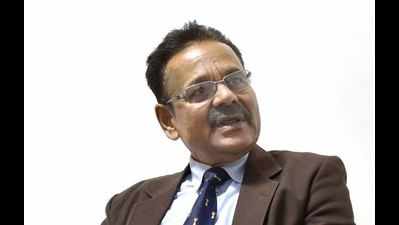- News
- City News
- ahmedabad News
- ‘26/11 changed how we look at marine security’
Trending
This story is from January 24, 2017
‘26/11 changed how we look at marine security’
The attacks by a small group of armed terrorists that took place on November 26, 2008, shook not only the nation but also forced the country’s military minds to change the scenario of coastal security.

Shekhar Sinha
AHMEDABAD: The attacks by a small group of armed terrorists that took place on November 26, 2008, shook not only the nation but also forced the country’s military minds to change the scenario of coastal security.
“After the incident, the government promulgated the security framework. Joint operations centres (JOC) were established for coordination with stakeholders.Coastal radars were installed and marine police was strengthened. A coastal security bill was introduced. However, we still have some distance to go,” said Shekhar Sinha, vice admiral (retired) of the Indian Navy and former chief of integrated defence staff, on Monday.
Sinha is conducting a three-day workshop with students of the homeland security course at the Gujarat Forensic Sciences University (GFSU) in Gandhinagar. Sinha said no other state is more important than Gujarat as far as maritime security is concerned due to its proximity to Pakistan and naval border issues.
“Gujarat not only is a front line state of the command but also has important economic assets. The state’s importance for the Navy can be assessed from the fact that it has now got a flag officer in the form of a rear admiral in Gandhinagar now,” he said. He added that the Navy has enjoyed good support from the administration and private players over the years.
“The future of naval warfare will be to influence decision-making of a foreign power in your favour and creating a conducive environment,” he added.
He also stressed on capacity building of communties living in coastal areas as it is not possible to man every part of the 7,500km-long coastline of India. “There are a number of ports which are not active but are used by dhows and fishing boats. We have to develop our eyes and ears to gather information on anything unusual,” said Sinha.
“After the incident, the government promulgated the security framework. Joint operations centres (JOC) were established for coordination with stakeholders.Coastal radars were installed and marine police was strengthened. A coastal security bill was introduced. However, we still have some distance to go,” said Shekhar Sinha, vice admiral (retired) of the Indian Navy and former chief of integrated defence staff, on Monday.
Sinha is conducting a three-day workshop with students of the homeland security course at the Gujarat Forensic Sciences University (GFSU) in Gandhinagar. Sinha said no other state is more important than Gujarat as far as maritime security is concerned due to its proximity to Pakistan and naval border issues.
“Gujarat not only is a front line state of the command but also has important economic assets. The state’s importance for the Navy can be assessed from the fact that it has now got a flag officer in the form of a rear admiral in Gandhinagar now,” he said. He added that the Navy has enjoyed good support from the administration and private players over the years.
Sinha suggested that the Coast Guard be made overall in-charge of coastal security, where they can run the JOC by posting marine police under the command of DG Coast Guard. “Navy should look after blue water, concentrating on issues such as keeping an eye on the Chinese in the Indian Ocean area,” said Sinha.
“The future of naval warfare will be to influence decision-making of a foreign power in your favour and creating a conducive environment,” he added.
He also stressed on capacity building of communties living in coastal areas as it is not possible to man every part of the 7,500km-long coastline of India. “There are a number of ports which are not active but are used by dhows and fishing boats. We have to develop our eyes and ears to gather information on anything unusual,” said Sinha.
End of Article
FOLLOW US ON SOCIAL MEDIA











